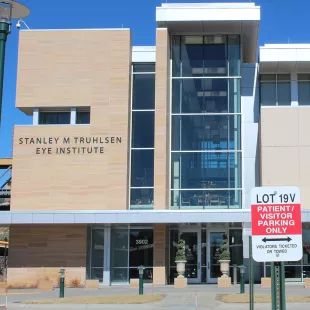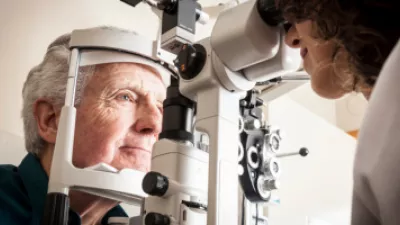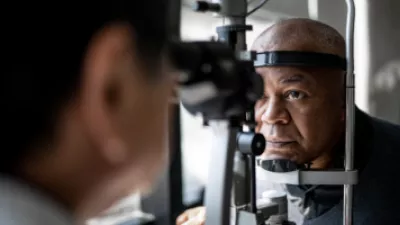Cataracts are a common eye condition where the lens of the eye hardens and loses clarity. Most adults will develop cataracts over the course of their lives. By age 80, the majority of Americans will have a cataract or will have had cataract surgery.
Some symptoms you may have cataracts include:
- Blurry or distorted vision.
- Difficulty seeing and driving at night.
- Frequent prescription changes in your eyeglasses.
- Bright colors appear faded or yellow.
The leading cause of cataracts is aging. As we get older, the proteins in our eye lens break down and cause the lens to become cloudy. Other factors that increase the risk of cataracts include diabetes, previous eye injuries, smoking and certain medications, including steroids.
To determine if you have a cataract, you will need to be examined by an eye doctor.
What to expect
At your first visit, your eye doctor will perform a thorough eye exam to assess the severity of your cataracts. Some testing may include evaluating your eyeglass prescription, glare testing and dilation. We’ll discuss how cataracts impact your daily life and your vision goals.
If you have mild cataracts, updating your eyeglass prescription might help improve your vision. However, when your blurry vision affects everyday tasks like reading and driving, it's time to consider cataract surgery.
What are my treatment options?
Standard, insurance-based cataract surgery: The natural lens is removed from your eye and is replaced with a clear, artificial lens. This surgical option is performed when cataracts significantly impair your vision and is often covered by insurance.
Refractive lens exchange: This procedure is for patients with cataracts that do not significantly impair their vision but wish to reduce their need for glasses or contact lenses. It is not covered by insurance. With three tiers of intraocular lens options to choose from, this is a fully customizable option for patients.
Light adjustable lens: The strength of your implanted lenses can be adjusted post-surgery, ensuring the best vision outcomes. This option is ideal for patients who have already had refractive surgery such as LASIK. This lens is available to patients undergoing either refractive lens exchange or standard cataract surgery. The lens itself is an out-of-pocket expense.
Laser-assisted cataract surgery: A surgical method where a laser creates incisions to soften the cataract before removal. This option is not covered by insurance.
Your ophthalmologist can help determine the best option for you based on your eye health and vision goals.
Why you should choose Nebraska Medicine
At Truhlsen Eye Institute, your vision and well-being are our top priorities. When you choose us for cataract surgery, you’re choosing compassionate, expert care from highly skilled ophthalmologists. Our board-certified surgeons use the latest technologies in cataract surgery to ensure the best possible outcomes. This includes advanced intraocular lenses and modern imaging tools.
Whether you’re considering traditional cataract surgery or newer options like light adjustable lenses, we offer a variety of customizable treatments tailored to your specific needs.
Our Locations
-

-

Truhlsen Eye Institute at Village Pointe Health Center
110 N 175th St.
Get Directions
Omaha, NE 68118
-
Why Make Nebraska Medicine Your Destination for Eye Care
Learn more about our top ranked facilities, care for the common to complex and dedication to clinical research.
View More

